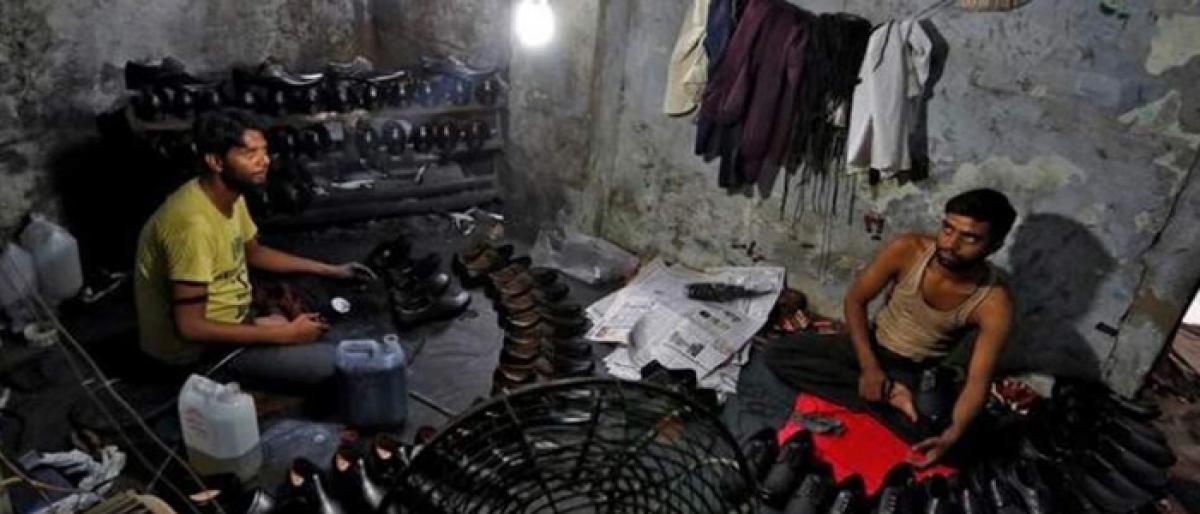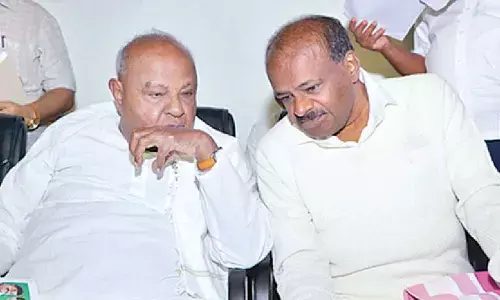Protecting unorganised labour

Jobs in the organised sector are shrinking Automation in the manufacturing sector and use of Artificial Intelligence in the services sector is reducing the demand for labour
Jobs in the organised sector are shrinking. Automation in the manufacturing sector and use of Artificial Intelligence in the services sector is reducing the demand for labour. This makes it necessary for us to think of ways to increase the incomes of the large number of our citizens working in the unorganised sectors. The government is considering instituting a scheme for providing retirement benefits, health, old-age pension, disability, unemployment and maternity benefits to the workers in the unorganised sectors.
The difficulty in this proposal is that the government will have to impose tax on other sectors to pay for these facilities. This is not possible in a global market. The country that imposes high taxes will find itself thrown out of the global market. The welfare state in the United States and those in the European Union are under severe pressure because their companies are burdened with heavy taxes and are not able to face global competition. Thus, the scheme being considered by the Modi government will not be able to provide effective relief. It may become a farce by providing only cosmetic benefits.
Other ways of providing benefits to the workers in the unorganised sectors are equally daunting. The unorganised workers could be organised into cooperative societies like Amul and SEWA in Gujarat. The difficulty is that large transaction costs are involved in running cooperatives. Members have to agree in order for a decision to be taken. The CEO spends large amounts of energies at these meetings.
Thus, it is seen that private textile mills and sugar mills are more successful than cooperatives because the CEO in the private sector is in a position to take business decisions quickly and undisturbed by individual interests of powerful members. The success of organisations like Amul is due to the presence of exceptional persons like V Kurien, who have the skills to manage both the business and transaction costs efficiently. This model is not replicable in absence of such exceptional persons.
The third suggestion is to establish global labour standards. Efforts can be made to specify minimum wages to be paid to the workers in the manufacture of goods that are exported. Goods produced with underpaid workers in the unorganised sectors will then not be imported into the rich countries. The difficulty is that such labour standards would apply only to goods that enter foreign trade. Goods produced by unorganised workers for domestic markets will remain outside such labour standards. These include sectors such as construction and cycle rickshaws. Hence, low wages will continue to prevail in the large domestic market.
The fourth suggestion is to provide loans to the poor through micro-credit institutions. Availability of capital will enable them to expand their level of production and help them increase their incomes. The difficulty is that labour-intensive production undertaken by micro sector is generally more expensive than machine made products. For example, handspun thread is more expensive than the thread produced in a spinning mill. Such goods can survive in the market only when they get protection from cheap machine-made goods. The charkha will survive only if the government imposes heavy tax on spinning mills.
Thus, we are seeing a huge decline in production in the unorganised sector. The numbers of fruit juice vendors, for example, is fast declining. The imposition of tax on machine-made production, however, is not possible in the global market. Cheap machine-made thread will be imported from Thailand if Government of India imposes tax on domestic spinning mills. Thus, micro-finance will be beneficial only when production in the unorganised sector is provided with protection from machine-made goods including imports.
The fifth suggestion is that unorganised workers should be organised into trade unions. They can secure higher wages forcibly as agricultural workers have done in Kerala. But farmers in Kerala have stopped cultivating rice and planted coconut trees in order to reduce their dependence on labour. This has led to loss of jobs for the agricultural workers. Kerala is importing foodgrains in large quantities now. The high cost of cultivation of paddy in Kerala has led to more imports of foodgrains.
In other words, wages cannot be forced upward in the unorganised sector. Trade unions are successful only where production is concentrated in a factory. In that case, the trade union can stage a strike and bring the production to halt and force the owner to negotiate. This is not possible in the unorganised sector because goods from other areas enter the market just as wheat from Punjab is entering the market of Kerala.
It is time to recognise that the market will not provide succor to the workers in the unorganised sectors. The market works on the single principle of efficient production. As countries develop, the price of capital declines and that of labour increases. This leads to businesses using expensive automatic machines instead of labour in the process of production. The demand for labour in the market declines and, as Marx called it, the workers are ‘immiserised.’ This is the logical result of the market. It is not visible in the rich countries because
technological innovations have given them monopoly over certain goods like the Windows software.
They are able to pay high wages to their workers by selling these goods at high prices to other countries. But the nature of technology is like that of water in the sea. It spreads quietly and equalises the level across the world. The industrial countries will lose this monopoly position as technology spreads. Simultaneously their ability to pay high wages will be eroded. The high import tariffs imposed by President Trump in America are an indication of the loss of technological edge by the United States and the consequent decline of wages in that country.
Be that as it may, we, the people of developing countries, have to face a hard decision – do we want cheap goods for the few who find employment; or we are willing to bear higher cost of goods in order to provide jobs to all? We should take the initiative to provide protection to labour-intensive goods from cheap machine-made goods in order to provide relief to the millions of our unorganised workers. The scheme of providing social security benefits to the workers in the unorganised sectors is good but not workable due to the huge financial burden of the same.
By: Dr Bharat Jhunjhunwala
Author was formerly Professor of Economics at IIM Bengaluru

















